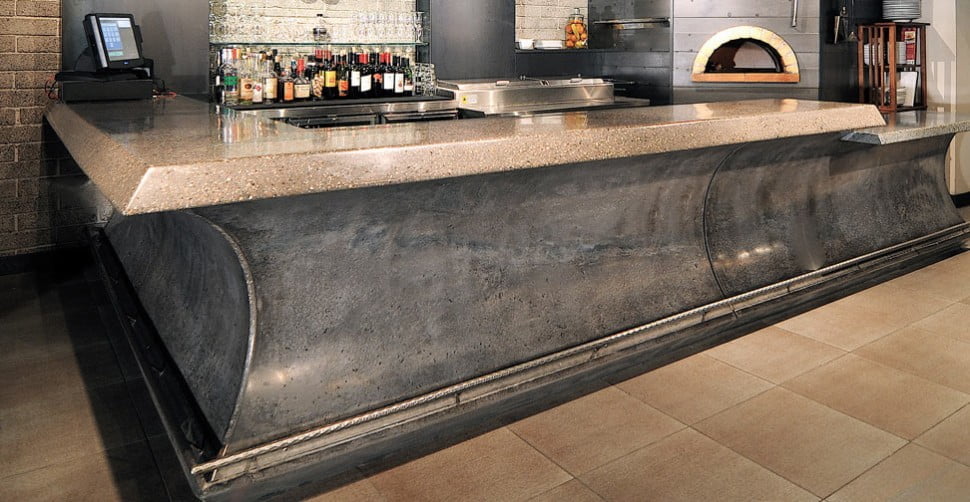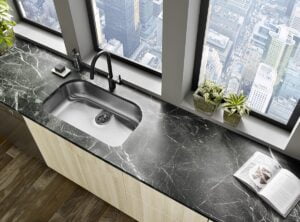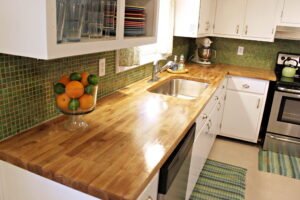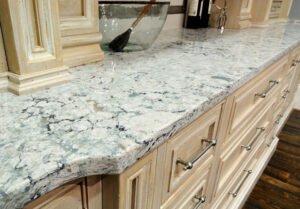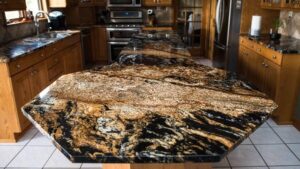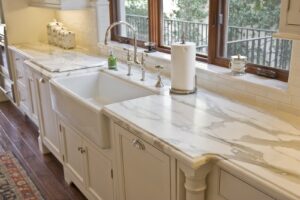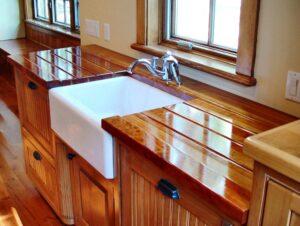Concrete kitchen countertops are an excellent choice for those who love unusual designs and unique shapes. And while concrete worktops have many benefits, you should also consider their drawbacks when going for this option.
Concrete is a solid foundation mostly used in building constructions and for filling roads and inter-floor openings. Thus, it is a proven material to be strong and durable, usually lasting at least 50 years. Therefore, a concrete kitchen bench will be reliable too.
Pros of Concrete Kitchen Countertops
Strength
Concrete composition makes for a lasting countertop. Thanks to the components in the mixture, the surface has high-temperature resistance. It can withstand hot objects, such as hot pans and grills. Moreover, the metal mesh inside the mix improves durability significantly, making it more resistant to cracking.
Eco-Friendly
The composition of concrete countertops consists only of natural materials, such as cement, sand, water, and natural additives with dyes. For this reason, it is completely safe for both humans and the environment.
Beautiful and Budget-Friendly
There is a big variation of concrete kitchen counters, especially in difficult forms. Therefore, concrete is an unusual and stylish replacement for more expensive worktops. For example, a concrete tabletop is far more strong and elastic than a wood kitchen countertop.
Since wood is not a flexible material, it is not possible to make all curve designs. Concrete, in turn, is poured into any shape and can be given even complex bends. Besides, the cost of concrete is several times less than wood, marble, or granite kitchen countertops.
Possibility of Creating Unique Designs
You can make individual designs from concrete. Also, you can add various decorations as the finish surface: shiny glass, shells, pieces of solid wood, color stones, etc. There’s absolutely any form available to make a worktop (circle, square, arc, star, zigzag). Furthermore, because you can use any color, a concrete countertop can be made to imitate granite, marble, or quartz.
Ease of Care and Maintenance Free
Use soap and a sponge, or any light wash formulations, to clean the concrete kitchen countertop. It’s not recommended to use any aggressive chemicals. The damages are easy to restore on a concrete surface. Just apply the compound to a chip or crack and wait for it to dry. After that, polish it up, and that’s it.
If you’re curious about the durability of these types of worktops, have a look at the video below. How difficult is it to break products made from concrete? The following video shows a concrete sink crash test, which is what you can expect from a countertop as well.
Cons of Concrete Kitchen Countertops
Finish Quality of Concrete is Unpredictable
As it is manual labor, the result will depend on the person pouring concrete. You don’t know in advance the quality of the countertop. It’s better to hire a professional team or do it by yourself. Only at the end of the project will you see the design you created. You can’t see it in a process, as there may be changes from what you want to achieve.
Acrylic Coating
In order to add waterproof and protective film on the concrete surface, some people apply an acrylic solution to the countertop. But this leads to a countertop that can be easily scratched because acrylic surface is very soft. Also, it can’t withstand temperatures above 150 degrees Celsius (302 Fahrenheit). Otherwise, there will be marks. The polymer coating is fragile, so avoid it when you can!
Porosity of Concrete
Because the kitchen, unlike the rest of the house, has high level of humidity, concrete cannot be left untreated due to its porous nature. Under those circumstances, bacteria and mold can breed in it. Therefore, uncoated countertops are better suited for dry spaces, like bedroom or common hall.
Low Resistance to Acids
Since the binder of the concrete countertop is based on calcium, it will break down from any type of acid. When exploiting such a worktop, you must be careful.
Manual Labor
Making concrete kitchen countertops is a manual labor, thus pouring concrete can be costly. The average concrete countertops cost is from $60-100 per square meter. Also, it takes a long time to make them. There are a lot of steps: frame, installation, drying, polishing, etc. For difficult designs, it even requires a professional service because of difficulty in mounting it to place due to its heavy weight.
Conclusion
Generally speaking, concrete is a strong material and worth being in your kitchen. The concrete kitchen countertop will delight you for many years to come with its reliability and beauty. With proper care and use, you will not have any problems.
